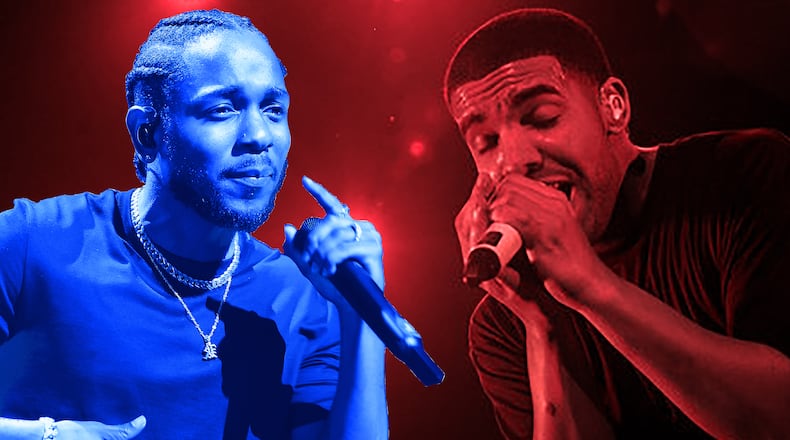Drake and Kendrick Lamar are at the center of rap’s latest beef, issuing a volley of dis tracks that began with a March release from Atlanta’s Future and Metro Boomin. Six weeks and innumerable insults later, Atlanta is back at center stage in this exhilarating beef, just as it becomes muddied in bars that read like a gossip column. Instead of Drake and Kendrick Lamar solely relying on their strengths, they reveal that they’re simply two sides of the same coin.
Atlanta influences everything
André 3000′s anthemic statement, “The South got something to say,” punctuated the 1995 Source Awards, heralding Atlanta as a new leader in rap. The moment came amid a bloodthirsty beef between East and West Coast hip-hop figures which ended in tragedy.
Today, Atlanta is fully steeped in that prophecy, and most of rap’s major players are Atlanta through and through, including Future and Metro Boomin. The rapper and producer duo are frequent collaborators (after all, they gave us Future’s magnum opus “DS2″).
Boominati Worldwide/Republic Records
Boominati Worldwide/Republic Records
But the pair have never created a joint album until this year. “We Don’t Trust You,” their first of a two-part act, dropped on March 22. The core of the 17-track album is absolute villainy. No song embodies this more than “Like That,” which features Kendrick Lamar. On the track, Lamar unearths a decade-long beef with Drake as J. Cole gets caught in the crossfire — kicking off a lengthy Kendrick vs. Drake battle royale that has all the pomp and circumstance of a terrible “Real Housewives” reunion.
Since the release of “Like That,” other rappers have deepened the shade, including Rick Ross, ASAP Rocky and Kanye West. J. Cole, following a lackluster Kendrick Lamar dis, swiftly bowed out of the beef. The North Carolina rapper said participating in the game just didn’t sit right with his spirit (translation: he didn’t want the smoke).
Drake officially responded to the Drake vs. Everybody train with “Push Ups,” a good not great dis that served as an appropriate reminder that he’s no stranger to rap beefs: “I could never be nobody number one fan/ Your first number one, I had to put it in your hand/ You [expletive] can’t get booked outside America for nan’/ I’m out in Tokyo because I’m big in Japan,” Drake rapped over a catchy beat.
The momentum of that track became irrelevant when Drake followed it up with a corny AI-influenced dis track soliciting Lamar’s response.
And, boy, did Drake get one.
Within the past week, we’ve gotten six dis tracks between the two artists (sometimes, on the same day, within the same hour) — charting the course for an exhilarating feud between two hip-hop heavyweights. Its best moments lie in Lamar’s unrelenting poking at Drake’s glaring identity issues.
With “Euphoria,” Lamar easily cemented himself as the battle’s victor, taking jabs at Drake’s rumored cosmetic surgery, his parenting skills (or lack thereof) and his complicated relationship with Blackness. It’s that final theme that’s the most interesting (and Lamar’s best use of his critical thinking skills).
As for Drake, his globe-trotting arc is more sourced in Atlanta than anywhere else. Since he hopped on the remix to Migos’ “Versace” over a decade ago, the rapper has used the city as the prime export to fuel his unparalleled superstardom. He contributed to the remix of ILoveMakonnen’s emo trap hit “Tuesday” only to end their relationship in bad blood, according to the Atlanta native. He took Migos on tour, made a joint album with Future and toured with him, made a joint album with 21 Savage and toured with him. He’s also creating an upcoming docuseries on Magic City.
Robb D. Cohen/.www.RobbsPhotos.c
Robb D. Cohen/.www.RobbsPhotos.c
While those could be perceived as good-faith moves, it’s not lost on me that he used Atlanta’s sauce to help him become a bigger star than the artists who live there.
Lamar said it best in “Not Like Us,” his most recent dis that’s already making a case for song of the summer:
“You called Future when you didn’t see the club/ Lil Baby helped you get your lingo up/ 21 gave you false street cred/ Thug made you feel like you a slime in your head/ Quavo said you can be from Northside/ 2 Chainz say you good, but he lied/ You run to Atlanta when you need a few dollars/ No, you not a colleague, you a [expletive] colonizer.”
Nice for what?
I wish the beef explored this topic further — or stayed in the realm of facts. Instead, it swiftly transformed into a dull clash that’s full of contradictions and rumors.
On “Family Matters,” a more calculated dis than “Push Ups,” Drake made several salacious accusations against Lamar, including him being an absent father and Dave Free (Lamar’s business partner) being the father of one of his kids. With “Meet the Grahams,” Lamar doubles down on Drake being an absent father himself, alleged he’s hiding another child, while bringing his mom and dad into the beef.
Ryan Fleisher
Ryan Fleisher
None of those claims seem to be remotely true, which made the songs feel less convincing. Shade is best delivered when it’s rooted in the truth. Drake critiquing Lamar’s short stature on “Push Ups” with “How the [expletive] you big steppin’ with a size-seven men’s shoe on?” is fun shade. Debating the paternity of one of Lamar’s children is just lousy and lazy. Maybe they should’ve consulted the Nene Leakes school of reads before writing a dis.
The most disgusting rumors of the Kendrick-Drake war arrive when they use women as pawns. Drake accuses Lamar of abusing his partner and mother of his two children. And Lamar repeatedly calls Drake a sex predator who’s infatuated with minors. Both are desperate moves from two rappers who seem to only call out abuse when it benefits them.
Drake’s last two albums have thrown unwarranted jabs at Megan Thee Stallion, Rihanna and Serena Williams (Drake’s disdain for the latter two, his exes, possibly exists because they found happiness without him). On Lamar’s Big Idea album, “Mr. Morale and the Big Steppers” he encouraged Black men to heal from their trauma and “give the women a break” while repeatedly featuring Kodak Black, a Florida rapper who pleaded guilty to assaulting a teenage girl.
With recent sexual assault and sex trafficking allegations against rap pioneers Russell Simmons and Diddy, the genre requires a massive reckoning in its treatment of women. Not a rap beef spoiled in an alleged abuser-off.
Who wins?
It’s hard to replicate what Pusha T did on 2018′s “The Story of Adidon” — the last time Drake was involved in a major rap beef. For three minutes, the Virginia native stuck with the facts: Drake having a child with a woman he barely knew. It was relatively new information, which made the dis all the more audacious. Kendrick tried to do this on “Meet the Grahams,” but his line alleging Drake has a daughter falls short for being a Pusha T-knockoff. And herein lies another flaw of the latest beef: lack of originality.
The speed of the gossipy responses makes the Kendrick-Drake clash feel like each rapper examined social media posts about the other and made a song out of it. They recycled old thoughts without pushing the discourse further. It took Ice Cube five months to release “No Vaseline” against his former group. And Nas waited three months ― on Jay-Z’s 32nd birthday ― to drop “Ether.” Both were well-calculated moves mainly drenched in facts and not fiction. It also helped propel the stardom of both rappers (“Ether” revived Nas’ career and “No Vaseline” powered Ice Cube’s appeal as a solo artist).
Andy Kropa/Invision/AP
Andy Kropa/Invision/AP
This latest beef is wrapped in so much darkness that neither rapper benefits. Sure, Lamar is an obvious winner because he’s the better rapper, but I’m not salivating for a new album of his, especially when the beef reminded me of his flaws. Same with Drake. He’ll still be a hitmaker. Drake never responded to “The Story of Adidon” (because he only wins rap beefs against rappers who aren’t smarter than him), but he had a no. 1 album (“Scorpion”) shortly after. But while Drake was doing that, Pusha T gained new fans, including myself. The dis was a turning point in Pusha T’s career for all the right reasons. The album he released that year, “Daytona,” marked the first time he received a Grammy nomination as a solo act.
The Kendrick vs. Drake beef didn’t make me more of a fan of either artist. At times, it was fun, but most of it was very weird and violent, its tone often possessing some of the rage of Tupac and Biggie’s beef. And we know how that ended. On Tuesday, a security guard was injured in a shooting outside of Drake’s Toronto mansion — the same house that appears on the cover art of Kendrick’s latest dis “Not Like Us.” While police said it’s too early to tell if the beef is at all connected to the shooting, it’s hard not to think about what could happen when a rap beef turns physical. We’ve seen it before.
Atlanta rap seems to be the only real winner in all of this. The city once again shaped (and was heavily mentioned in) a major hip-hop moment that’ll be remembered for years to come ― proving that most of today’s hip-hop culture doesn’t exist without the city.
About the Author









